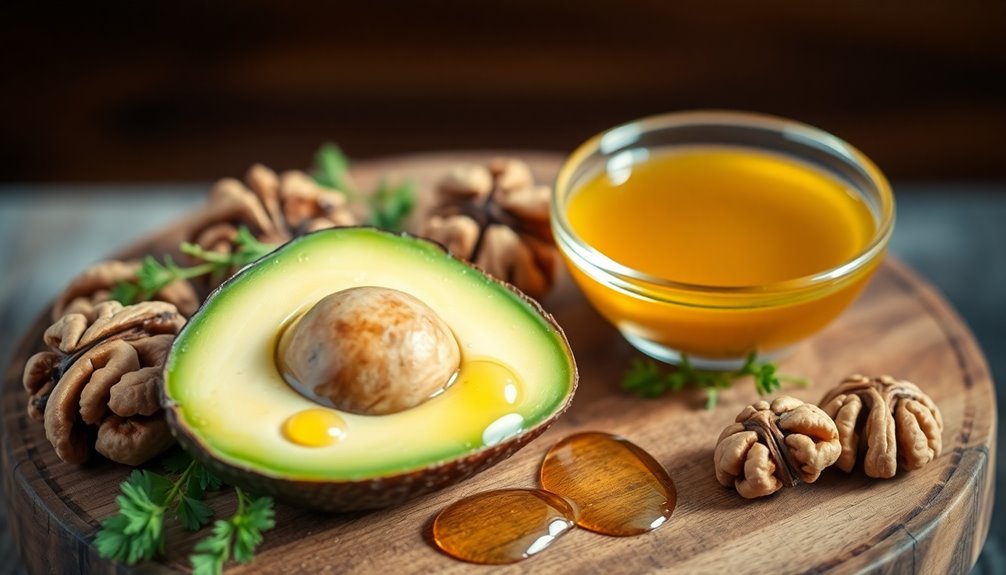Omega-3 fatty acids are crucial for your skin and hair health. They fortify your skin barrier, enhance hydration, and improve elasticity, while also reducing fine lines and wrinkles. Omega-3s help combat inflammation related to conditions like acne and eczema by regulating oil production and soothing redness. For your hair, these fatty acids nourish follicles, boost growth, and increase thickness. They also improve blood circulation to your scalp, promoting overall hair importance. Incorporating sources like fatty fish, flaxseeds, and walnuts into your diet can significantly improve your appearance and well-being. Discover more benefits and effective ways to integrate them into your routine.
Key Takeaways
- Omega-3 fatty acids enhance skin hydration, improve barrier function, and reduce the appearance of wrinkles and fine lines.
- They help combat inflammatory skin conditions like acne, eczema, and psoriasis by regulating oil production and minimizing redness.
- Omega-3s support hair growth by nourishing hair follicles and improving scalp circulation, leading to increased hair density and thickness.
- These fatty acids strengthen the skin's barrier against environmental stressors, promoting elasticity and protecting against pollution and premature aging.
- Omega-3-rich foods like fatty fish, chia seeds, and walnuts are versatile and easy to include in your diet for overall skin and hair wellness.
Understanding Omega-3 Fatty Acids

When you think about necessary nutrients, omega-3 fatty acids often come to mind, but their impact on skin and hair health might surprise you. Omega-3s are polyunsaturated fats that your body can't produce on its own, making it essential to obtain them from dietary sources. Common omega-3 sources include fatty fish like salmon and mackerel, flaxseeds, chia seeds, and walnuts. Incorporating these foods into your diet can lead to significant skin benefits that you may not have realized.
Research shows that omega-3 fatty acids play a vital role in maintaining skin integrity. They help to strengthen the skin barrier, which is important for retaining moisture and protecting against environmental stressors. This is particularly significant for those prone to dry skin or inflammatory conditions like eczema and psoriasis.
Studies have indicated that regular consumption of omega-3s can reduce inflammation, leading to a noticeable improvement in skin texture and overall appearance.
Additionally, omega-3s contribute to the production of collagen, a protein that provides structure to your skin and hair. A healthy level of collagen not only enhances skin elasticity but also supports hair strength, minimizing breakage. By focusing on omega-3 sources in your diet, you're not just nourishing your body but also investing in the health of your skin and hair. Drinking water from SlimCrystal bottles can further enhance your overall health and vitality, complementing your efforts in skincare.
This holistic approach fosters a sense of belonging to a community that values self-care and well-being, recognizing the interconnectedness of nutrition and beauty.
Omega-3s and Skin Hydration

Omega-3 fatty acids greatly improve skin hydration, making them an essential component of any skincare routine. These beneficial fats are known to enhance the skin's barrier function, which helps retain moisture and prevents dryness. When your skin is properly hydrated, it not only feels softer and more supple, but it also exhibits improved skin elasticity.
This elasticity is pivotal for maintaining a youthful appearance, as it allows your skin to bounce back from stressors and daily wear.
Research shows that incorporating omega-3s into your diet can play a significant role in wrinkle prevention. By promoting hydration and elasticity, these fatty acids can help minimize the appearance of fine lines and wrinkles. You might find that your skin looks plumper and healthier, which fosters a sense of belonging to a community that values natural beauty and wellness.
Moreover, omega-3s can be found in various food sources like fatty fish, flaxseeds, and walnuts, making it easy for you to include them in your meals. You could also consider high-quality supplements if you're not getting enough through food alone. Additionally, omega-3s are known to promote rapid fat loss, which can contribute to an overall healthier appearance and boost your confidence.
Reducing Inflammation With Omega-3s

In the field of skin and hair health, reducing inflammation is essential, and omega-3 fatty acids play a pivotal role in this process. These beneficial fats can help combat various inflammatory conditions, including acne, eczema, and psoriasis. By incorporating omega-3s into your diet or skincare routine, you can foster a healthier complexion and alleviate some of the discomfort associated with these skin issues.
Research shows that omega-3s work by inhibiting the production of pro-inflammatory compounds in the body. This action helps to maintain skin integrity and promote healing. Here are some key benefits of omega-3s in reducing inflammation:
- Balances oil production: Helps regulate sebum production, reducing the risk of acne breakouts.
- Strengthens skin barrier: Enhances the skin's protective barrier, making it less susceptible to irritants.
- Reduces redness and irritation: Alleviates symptoms of eczema and psoriasis, leading to calmer skin.
- Promotes faster healing: Aids in recovering from inflammatory skin conditions more quickly.
- Boosts overall skin health: Contributes to a more radiant complexion by reducing inflammation.
Including omega-3-rich foods like fatty fish, flaxseeds, and walnuts in your diet can make a significant difference. If you prefer topical solutions, look for skincare products that contain omega-3s. By being proactive about inflammation, you'll not only improve your skin's health but also enhance your overall sense of well-being. Additionally, managing stress through mind/body techniques can further support your skin's health by reducing systemic inflammation.
Embracing these changes can foster a community of support as you navigate your skin health journey.
Omega-3s for Hair Growth

Healthy skin and hair are closely linked, and just as omega-3s support skin health by reducing inflammation, they also promote hair growth. Research shows that omega-3 fatty acids play a vital role in nourishing your hair follicles, which can lead to increased hair density and overall liveliness. When you incorporate omega-3s into your diet, you're not just enhancing your skin; you're actively working to stimulate follicles, encouraging them to produce healthier strands.
One of the most significant benefits of omega-3s is their ability to promote thickness in your hair. These essential fatty acids help improve blood circulation to the scalp, ensuring that your hair follicles receive the nutrients they need to thrive. Studies have indicated that individuals who consume adequate amounts of omega-3s often experience less hair thinning and a more robust hair structure.
Moreover, omega-3s contain anti-inflammatory properties that can combat issues like scalp irritation. A healthy scalp creates an ideal environment for hair growth, making it easier for your hair to flourish. Including sources like fatty fish, flaxseeds, and walnuts in your meals can make a noticeable difference in your hair's appearance and health. Additionally, incorporating whole-food protein into your diet can further support hair vitality by providing essential nutrients that promote overall hair health.
Protecting Against Environmental Damage

Environmental harm can cause chaos on your skin and hair, leading to premature aging and dryness. With increasing pollution levels and harsh weather conditions, it's essential to arm yourself with effective strategies to protect your beauty. Omega-3 fatty acids play a crucial role in fighting pollution and preventing aging, ensuring your skin and hair remain healthy and vibrant.
Integrating Omega-3s into your diet can help strengthen your skin's barrier, making it more resistant against environmental stressors. Here are some benefits of Omega-3s that can aid in protecting against harm:
- Hydration: Omega-3s help maintain moisture levels, preventing dryness and flakiness.
- Anti-inflammatory properties: They reduce inflammation, which can be worsened by pollution.
- Cell membrane support: Omega-3s fortify skin cells, enhancing their ability to resist toxins.
- Promoting elasticity: They improve skin elasticity, combating the signs of aging.
- Boosting overall health: Omega-3s contribute to your body's overall well-being, which reflects on your skin and hair. Additionally, studies suggest that keto diets may also complement the benefits of Omega-3s by supporting metabolic processes that enhance skin health.
How to Incorporate Omega-3s

Incorporating Omega-3s into your diet can greatly enhance your skin and hair health, providing a practical solution to combat environmental damage. These essential fatty acids are known to reduce inflammation, improve hydration, and promote overall strength, making them a critical component of your wellness journey. Additionally, studies indicate that incorporating ketogenic diets can have long-term benefits for overall health, which may complement the effects of Omega-3s.
To start, consider adding Omega-3 rich foods to your meals. Fatty fish like salmon, mackerel, and sardines are excellent sources, offering a wealth of nutrients while being delicious and versatile.
If you're not a fan of fish, try incorporating plant-based options like chia seeds, flaxseeds, and walnuts into your diet. These can easily be added to smoothies, oatmeal, or salads, making it simple to enjoy their benefits.
If you find it challenging to consume enough Omega-3 rich foods daily, Omega 3 supplements can be a practical substitute. Fish oil capsules or algae-based supplements are widely available, providing a convenient way to meet your nutritional needs.
Before starting any supplement regimen, it's wise to consult with a healthcare professional to determine the appropriate dosage for your individual needs.
Frequently Asked Questions
Can I Get Enough Omega-3s From Plant Sources Alone?
Yes, you can obtain sufficient omega-3s from plant sources, but it's important to comprehend omega-3 absorption. ALA, the plant-based variety of omega-3, is less effectively transformed into EPA and DHA, the types your body mainly requires. Introducing vegan substitutes such as flaxseeds, chia seeds, and walnuts can assist, but you may wish to think about supplements or fortified foods to guarantee you're fulfilling your omega-3 needs efficiently.
Maintaining a balanced intake is essential for peak health.
Are There Any Side Effects of Omega-3 Supplements?
Imagine sailing a ship through calm waters; too much wind can capsize you. Similarly, while omega-3 supplements can be beneficial, high dosages may lead to side effects like gastrointestinal discomfort or bleeding issues. It's essential to monitor omega-3 dosage for best omega-3 absorption. By understanding your limits, you guarantee a smooth journey toward wellness.
Always consult a healthcare professional before starting any supplement regimen, as they can guide you safely through these waters.
How Long Does It Take to See Results From Omega-3s?
When you begin using omega-3 supplements, you might notice some immediate effects, like improved mood or reduced inflammation. However, significant changes typically require consistency.
Most individuals observe noticeable results in about 4 to 12 weeks, depending on their individual health and diet. Staying dedicated to your omega-3 regimen is crucial for enjoying the full advantages.
Do Omega-3s Interact With Other Medications?
Omega-3s often influence various medications, so it's important to think about potential omega-3 drug interactions. Some drugs, especially blood thinners, might enhance the effects of omega-3s, leading to increased bleeding risks.
Additionally, omega-3 absorption rates can vary based on your current medications, impacting their overall effectiveness.
Always consult your healthcare provider before starting omega-3 supplements to guarantee your safety and optimize your health while fostering a supportive and informed community around you.
Are There Specific Omega-3 Brands Recommended for Skin and Hair Health?
When selecting the top omega-3 brands for skin and hair health, consider premium options such as Nordic Naturals or Carlson Labs. These brands frequently offer concentrated formulas abundant in EPA and DHA. Dosage recommendations usually advise 1,000 to 2,000 mg daily for maximum benefits.
Always consult a healthcare professional before beginning any new supplement routine to guarantee it matches your individual health needs and goals. You deserve the finest for your skin and hair!
Conclusion
Incorporating omega-3 fatty acids into your diet can work wonders for your skin and hair health. By enhancing hydration, reducing inflammation, and promoting hair growth, these nutrients act like a superhero for your beauty routine. Additionally, their protective properties against environmental damage make them a must-have for anyone seeking radiant skin and luscious locks. So, don't underestimate the power of omega-3s; they could be the magic elixir you've been searching for to elevate your self-care regimen.



